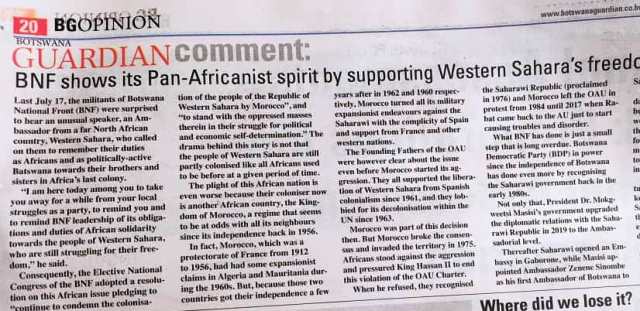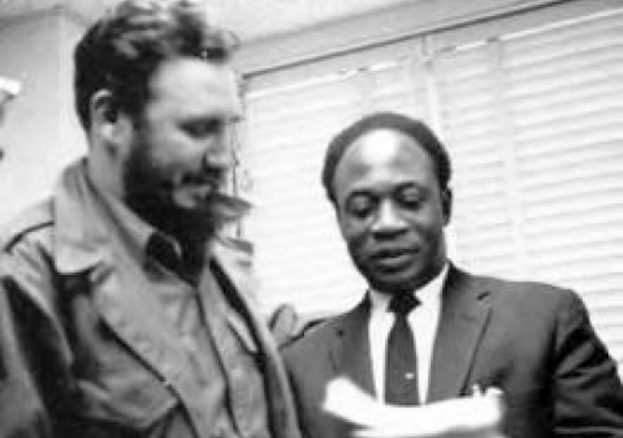
Last July 17, the militants of Botswana National Front (BNF) were surprised to hear an unusual speaker, an Ambassador from a far North African country, Western Sahara, who called on them to remember their duties as Africans and as politically-active Batswana towards their brothers and sisters in Africa’s last colony.
“I am here today among you to take you away for a while from your local struggles as a party, to remind you and to remind BNF leadership of its obligations and duties of African solidarity towards the people of Western Sahara, who are still struggling for their freedom,” he said.
Consequently, the Elective National Congress of the BNF adopted a resolution on this African issue pledging to “continue to condemn the colonisation of the people of the Republic of Western Sahara by Morocco”, and “to stand with the oppressed masses therein in their struggle for political and economic self-determination.”

The drama behind this story is not that the people of Western Sahara are still partly colonized like all Africans used to be before at a given period of time. The plight of this African nation is even worse because their coloniser now is another African country, the Kingdom of Morocco, a regime that seems to be at odds with all its neighbours since its independence back in 1956.
In fact, Morocco, which was a protectorate of France from 1912 to 1956, had had some expansionist claims in Algeria and Mauritania during the 1960s. But, because those two countries got their independence a few years after in 1962 and 1960 respectively, Morocco turned all its military expansionist endeavours against the Saharawi with the complicity of Spain and support from France and other western nations.
The Founding Fathers of the OAU were however clear about the issue even before Morocco started its aggression. They all supported the liberation of Western Sahara from the Spanish colonialism since 1961, and they lobbied for its decolonization within the UN since 1963. Morocco was part of this decision then. But Morocco broke the consensus and invaded the territory in 1975. Africans stood against the aggression, and pressured King Hassan II to end this violation of the OAU Charter. When he refused, they recognized the Saharawi Republic (proclaimed in 1976) and Morocco left the OAU in protest from 1984 until 2017 when Rabat came back to the AU just to start causing troubles and disorder.
What BNF has done is just a small step that is long overdue. Botswana Democratic Party (BDP) in power since the independence of Botswana has done even more by recognising the Saharawi government back in the early 1980s. Not only that, President Dr. Mokgweetsi Masisi’s government upgraded the diplomatic relations with the Saharawi Republic in 2019 to Ambassadorial level. Thereafter, Saharawi opened an Embassy in Gaborone, while Masisi appointed Ambassador Zenene Sinombe as his first Ambassador of Botswana to Saharawi in March 2022.
Saharawi people have a right to solidarity not only with African nations, but with all lovers of peace around the world. They are not only fighting for their national rights, they are fighting for a fundamental right that all nations must defend: The right of all peoples to self-determination and political independence.
In fact, in every given opportunity the Saharawi Ambassador keeps reminding all and sundry that Saharawis should not be left alone in this fight because they are defending everybody’s rights to freedom and self-determination. It is in this context that he asked the BNF congress to also support the people of Palestine in their legitimate struggle for independence.
Source: Botswana Guardian







